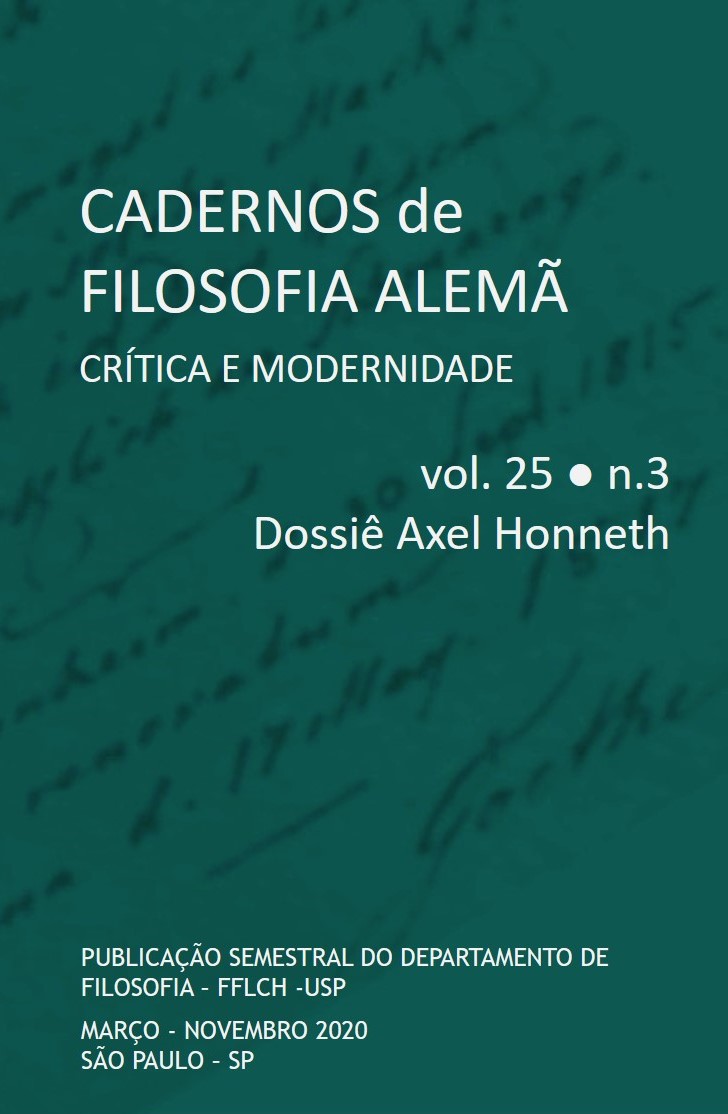Beyond legality: law and anti-legalism in the recent critical theory
DOI:
https://doi.org/10.11606/issn.2318-9800.v25i3p113-136Keywords:
anti-legalism, democracy, recognition, Axel Honneth, Jürgen HabermasAbstract
William Scheuerman finds a vigorous “anti-legalist” tendency in recent critical theory, which jeopardizes the democratic rule of law as the main normative basis and practical field for emancipatory struggles. According to him, this tendency finds in Axel Honneth one of its greatest exponents and represents a rupture with Habermas’ Between Facts and Norms in favor of an orientation contrary to the law that feeds social criticism since Marx’s times. Starting from the objections to anti-legalism, I would like to explore its possible meanings in Axel Honneth's recent work, the lines of continuity with this former theoretical background, and the motives of its vindication regarding the persistence and vitality of social criticism.
Downloads
References
Anderson, J. (2013). The fragile accomplishment of social freedom. Krisis. Journal for Contemporary Philosophy, 1, 18-22.
Bray, M. (2013). Translating Anarchy: The Anarchism of Occupy Wall Street. Winchester: Zero Books.
Brink, B. (2013), From personal relations to the rest of society. Krisis. Journal for Contemporary Philosophy, 1, 23-27.
Brito, G. B. (2020). Desobediência civil entre pós-nacionalização e digitalização. Dissonância: Revista de Teoria Crítica, AOP (Advance Online Publication).
Deflem, M. (2013). “The Legal Theory of Jürgen Habermas”. In: Banakar, R.; Travers, M. Law and Social Theory. Oxford: Hartman Publishing.
Fraser, N. (2010). Scales of Justice: Reimagining Political Space in a Globalizing World. New York: Columbia University Press.
Garcia, R. (2020). Crítica Reconstrutiva em Axel Honneth. Dissertação (Mestrado em Filosofia) – Universidade Federal do Rio Grande do Sul. Porto Alegre.
Gerbaldo, P. (2017). The Mask and the Flag. Populism, Citizenism and Global Protest. Oxford: Oxford University Press.
Graeber, D. (2002). The New Anarchists. New Left Review, 13, 61-73.
Habermas, J. (1992). Faktizität un Geltung. Beiträge zur Diskurstheorie des Rechts und des demokratischen Rechtsstaats. Frankfurt a. M.: Suhrkamp. [Idem, (2020). Facticidade e validade. Trad. Felipe Silva e Rúrion Melo. São Paulo: Ed. Unesp]
Habermas, J. (2015). A Nova obscuridade. Pequenos escritos Políticos V. São Paulo: Ed. Unesp.
Honneth, A. (2001). “Redistribution as Recognition: a response to Nancy Fraser”. In: Fraser, N. Honneth, A. Redistribution or Recognition. A Political-Philosophical Exchange. London: Verso.
Honneth, A. (2002). Grounding Recognition: A Rejoinder to Critical Questions. Inquiry, 45, 499-520. DOI: https://doi.org/10.1080/002017402320947577
Honneth, A. (2003). Luta por reconhecimento: A Gramática Moral do Conflitos Sociais. São Paulo: Editora 34.
Honneth, A. (2007a). “Democracy as Reflexive Cooperation: John Dewey and the Theory of Democracy Today.” In: Disrespect: The Normative Foundations of Critical Theory. Cambridge: Polity Press.
Honneth, A. (2007b). “The social dynamics of disrespect: on the location of critical theory today”. In: Disrespect: The Normative Foundations of Critical Theory. Cambridge: Polity Press.
Honneth, A. (2011). Das Recht der Freiheit: Grundriss einer demokratischen Sittlichkeit. Frankfurt/A: Suhrkamp.
Honneth, A. (2017). Beyond the Law: A Response to William Scheuerman. Constellations, 24(1), 126-132. DOI: https://doi.org/10.1111/1467-8675.12272
Jansen, Y. (2013) The ‘Us’ of democratic will-formation and globalization. Krisis. Journal of Contemporary Philosophy, 1, 32-36.
Jütten, T. (2015) Is the Market a Sphere of Social Freedom?. Critical Horizons, 16(2), 187–203. DOI: https://doi.org/10.1179/1440991715Z.00000000047
Lima e Silva, G.; Silva, F. (2017). “Between experience and structure: Social suffering, collective identities and justice in Iris Marion Young”. In: Bueno, A.; Teixeira, M. (orgs.). On the politics of social suffering. Digithum, 23, Barcelona.
Melo, R. S. (2014). Da teoria à práxis? Axel Honneth e as lutas por reconhecimento na teoria política contemporânea. Revista Brasileira de Ciência Política, 15, 17-36. DOI: https://doi.org/10.1590/0103-335220141502
Rosenfeld, M.; Arato, A. (1998). Habermas on Law and Democracy: Critical Exchanges. Berkeley: University of California Press.
Schaub, J. (2018). Aesthetic freedom and democratic ethical life: A Hegelian account of the relationship between aesthetics and democratic politics. European Journal of Philosophy, 27(1). DOI: https://doi.org/10.1111/ejop.12403
Scheuerman, W. (2017). Recent Frankfurt Critical Theory: Down on Law? Constellations, 24(1), 113-125. DOI https://doi.org/10.1111/1467-8675.12218 [A teoria crítica frankfurtiana recente: Avessa ao direito?. Tradução Bianca Tavolari. Dissonância: Revista de Teoria Crítica, 2018].
Scheuerman, W. (2018). Civil Disobedience. Malden: Polity Press.
Tavolari, B. M. D. (2019). Origens da juridificação: direito e teoria crítica. Tese (Doutorado em direito) – Universidade de São Paulo, São Paulo.
Teixeira, M. (2019). “Can Honneth’s Theory Account for a Critique of Instrumental Reason? Capitalism and the Pathologies of Negative Freedom”. In: Schmitz, V. (ed.). Axel Honneth and the Critical Theory of Recognition. London: Palgrave Macmillan.
Young, I. (2000). Inclusion and Democracy. Oxford: Oxford University Press.
Downloads
Published
Issue
Section
License
Copyright (c) 2020 Felipe Gonçalves Silva

This work is licensed under a Creative Commons Attribution-NonCommercial-ShareAlike 4.0 International License.
Information and conceptions on the texts are complete responsibility of the authors.
All the articles submitted before July 5th 2018 and those published after July 2021 are licensed under a CC BY-NC-ND license – except those published between the aforementioned dates, which are under the CC BY-NC-SA license. The permission for the translation of the material published under the license CC BY-NC-ND by third parts can be obtained with the consent of the author.
Open access policies - Diadorim
Rules applied before July 5th 2018:
Presenting a submission to our Editorial Board implies granting priority of publication for “Cadernos de filosofia alemã”, as well as transferring the copyright of texts (once published), which will be reproduced only with the manifest authorization of the editors. Authors keep the right to reuse the texts published in future editions of their work, without paying any fees to "Cadernos”. We will not grant the permission to re-edit or translate the texts for third parts without agreement of the author.


